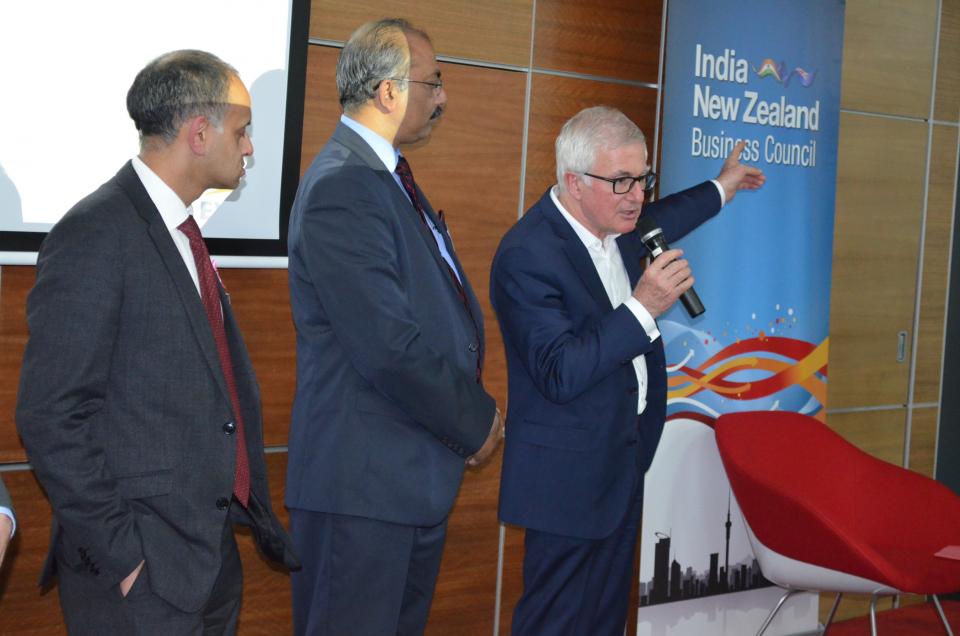TPP may mean good news for India FTA
Friday, 23 October 2015
Speaking at a recent finance sector focus event of the India New Zealand Business Council [INZBC], Trade Minister Tim Groser expressed hope that the signing of the TPP will have a positive impact on trade negotiations with India, and it may also speed up the process.
“The New Zealand Government is committed to a good quality FTA with India, but having said that, the FTA is also not a block to do bi-lateral trade with India even today." The Minister said "it’s time smart Indian companies did business with smart Kiwi companies”.
He emphasised the need to look beyond dairy and horticulture and look at the niche technologies New Zealand has to offer.
As part of it’s Business Beyond Barrier series, INZBC and Westpac hosted a finance sector focus talk. Minister Groser, who had just returned from the conclusion of the TPP, gave a thought provoking speech in terms of the macro perspective and what the agreement means to the New Zealand and India bilateral trade relationship.
With regard to the signing of the TPP, Satish Ranchhod, senior economist at Westpac said that from past experience the largest gains come from creating trade opportunities that didn’t previously exist.
“The Trans-Pacific Partnership agreement provides for the complete elimination of tariffs on New Zealand’s exports to signatory nations, with two exceptions. First, there has been only a partial liberalisation of trade restrictions on dairy products. Second, tariffs on beef exports to Japan will remain, but will be lowered.
"Once it is fully implemented, MFAT estimates that the TPP will provide tariff savings of $259 million a year, based on today’s export volumes. And this is probably understating the benefits to New Zealand’s exporters,” says Ranchhod.
Another speaker at the event, EY partner Paul Smith, had a different view. “Although the TPP is by no means a perfect agreement, it is still critical for New Zealand to be part of due to the potential for massive tariff savings.”
Smith provided insights regarding the indirect tax pitfalls and opportunities that arise in global trade. He covered the importance of having an in-depth understanding of your supply chain to avoid the risks and maximise the opportunities; and highlighted the reasons why preferential tariffs are not delivered to exporters on a silver platter and the dangers of making assumptions by contrasting indirect taxes in New Zealand to indirect taxes in India.
Ranchhod, in giving an overview of both the New Zealand and Indian economies, concluded that despite a challenging global backdrop, both India and New Zealand have grown at a firm pace over the past year. “Looking ahead, both economies will face challenges. Growth in New Zealand is expected to moderate to rates a little below trend. However, conditions in India are expected to remain firm. Over time, we expect the ties between the two countries – both economic and social – will continue to grow," said Satish.
From a political veiwpoint, Sandeep Sood, Chargé d’Affaires at the High Commission of India, spoke at length about the steadfast growth that India's showing despite global challenges.
“After the fall in Chinese markets, the Kiwi Dollar has lost up to 20 percent of its value against the US dollar. The Indian Rupee has also seen some volatility. However, economists the world over have remained positive about the Indian economy as India offers unique demographic advantages. Higher domestic consumption of about 70 percent of GDP, as against lower levels for other countries, offers a cushion to India’s economy," said Sood. "We must acknowledge that in 2014 the GDP of India was US$2.07 trillion.”
Sood also highlighted that the 'Make in India' initiative, which was launched in September 2014, has had a tremendous impact on the investment climate of the country, as shown by significant growth of overall Foreign Direct Investment (an increase of 48 percent in in-flows from October 2014 to April 2015). The FDI inflow under the approval route has shown even better growth of 87 percent during 2014-15.
At the Business Beyond Barrier event an MOU was signed between the British New Zealand Business Association (BNZBA) and the INZBC, delivering reciprocal benefits to both organisations.
Sandeep Sood was esprecially appreciative of the work done by INZBC in promoting bilateral trade between the two countries.


